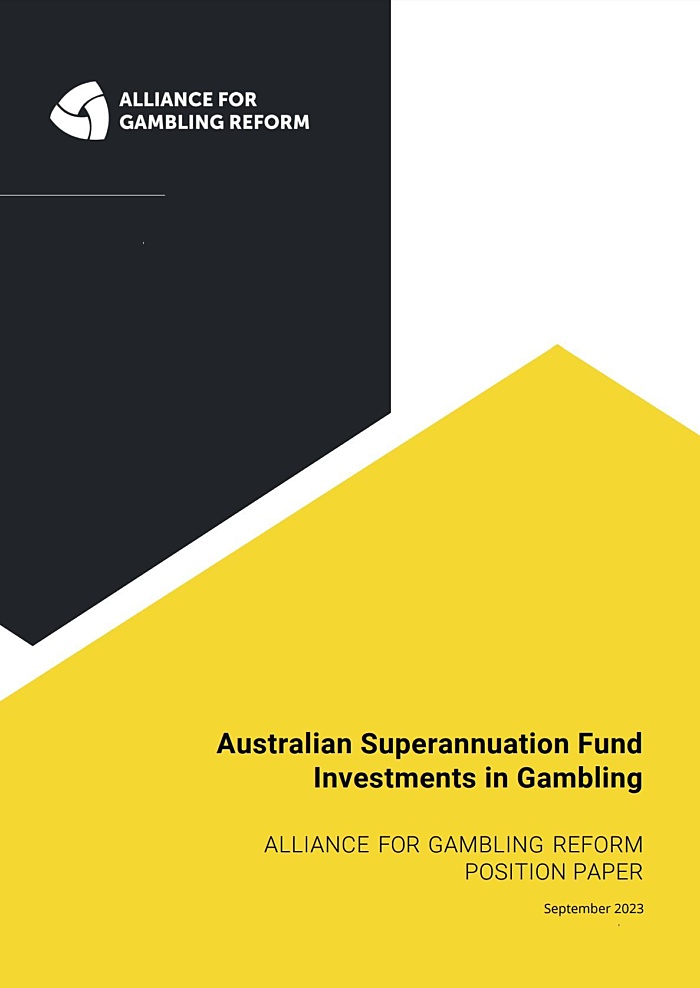
Attention governments: There’s more to giving out grants than handing over the money
Posted on 18 Feb 2026
Around 50 per cent of all funding for charities in Australia comes from government. The nature of…
Posted on 05 Oct 2023
By Greg Thom, journalist, Institute of Community Directors Australia

Responsible gambling advocates have called for greater consumer transparency around superannuation funds investment in gambling stocks.
They have urged the federal government to intervene to make it easier for people to check if super funds who claim to offer sustainable investment options are actually ‘walking the talk.’
The call follows analysis by the Alliance for Gambling Reform (AGR) which showed superannuation funds have invested billions of dollars in gambling and poker machine companies.
An AGR position paper titled Australian Superannuation Fund Investments in Gambling revealed that the ten biggest industry super funds hold at least one major gambling shareholding in their portfolio.
The top ten’s shareholding in poker machine manufacturer Aristocrat alone totals $1.67 billion.

While super funds are required by law to disclose their investments twice a year, the anti-gambling campaigners said it can be extremely difficult for consumers to make sense of the information as it is currently presented online.
The Alliance called on Canberra to:
Alliance for Gambling Reform CEO Carol Bennett said Australians had a right to know if their money is being invested in industries such as gambling that cause harm in the community.
“There should be an onus on the funds to disclose their interests in a way that members can access and at the moment, that’s just not the case,” she said.
“They should be able to make a choice about where they want their superannuation to be held and they should be able to make that choice based on their interests and their ethical concerns.”
The AGR analysis revealed HESTA, an industry super fund with millions of members that promotes itself as a responsible investor, holds more than $351 million in gambling related stocks.
These include shares valued at $198 million in poker machine manufacturer Aristocrat Leisure and gambling-related companies the Endeavour Group ($51 million) and Sportsbet owned Flutter ($39 million).
“There should be an onus on the funds to disclose their interests in a way that members can access and at the moment, that’s just not the case.”
The position paper accused some super funds of engaging in ‘greenwashing,’ citing as an example Hesta’s promotion on its website of the fund’s strong focus on responsible investment:
“Super with impact is the positive outcome we create by supporting our members to face the future with confidence, being a gutsy advocate for a fair and healthy community and delivering investment excellence with impact.”
Ms Bennett said the analysis focused on HESTA as an example because its members are drawn from occupations such as community workers, nurses, and the aged care sector – individuals likely to be dismayed their money is being invested in an industry that causes harm.
“They represent people who work with those with gambling harm and are people who would most want to know that their hard-earned mandatory superannuation was not going into ethical investments,” she said.

“Because it matters to them. They work in areas that make a difference and you’d expect those people want to make a difference with their investments as well.”
The position paper cites research which indicates Australians are becoming more attuned to ethical investing and care about how their super funds are invested.
A survey by the Responsible Investment Association Australasia (RIAA) found:
Ms Bennett dismissed the claim by some super funds that by investing in gambling companies they can bring influence to bear to reduce gambling harm.
“We have not seen any evidence to support this claim,” she said.
“The gambling industry is a predatory industry that preys on the vulnerable and rips out $25 billion in losses from communities across Australia.
“There is no place for superannuation funds to be investing our money in such equities – especially those funds that spruik their ethical credentials so prominently.”
A HESTA spokesperson declined to comment.

Posted on 18 Feb 2026
Around 50 per cent of all funding for charities in Australia comes from government. The nature of…

Posted on 18 Feb 2026
You wouldn’t try to fix a complex system with one tool. You’d widen the toolkit, improve the…

Posted on 18 Feb 2026
Australia’s champion laundry van charity, Orange Sky, has announced it is ready to expand into…

Posted on 18 Feb 2026
To have any hope of hitting the grand plan of doubling philanthropy by 2030, Australia needs one…

Posted on 18 Feb 2026
When Nyiyaparli woman Jahna Cedar travels to New York next month as part of the Australian…

Posted on 17 Feb 2026
This is the full academic version of Dr Oksana King's thoughts on the need to better compensate and…

Posted on 12 Feb 2026
Our special NFP trends report distils the views of more than two dozen experts.

Posted on 11 Feb 2026
The ballooning cost-of-living crisis is affecting Australian families to the extent that many…

Posted on 11 Feb 2026
Rev. Salesi Faupula is the Uniting Church’s moderator for the synod of Victoria and Tasmania. Born…

Posted on 11 Feb 2026
Service providers have expressed cautious support for the federal government’s Thriving Kids…

Posted on 11 Feb 2026
Australia’s not-for-profits need strategic investment by the federal government to support the…

Posted on 11 Feb 2026
For the first time, charities commissioner Sue Woodward has confirmed the Australian Charities and…